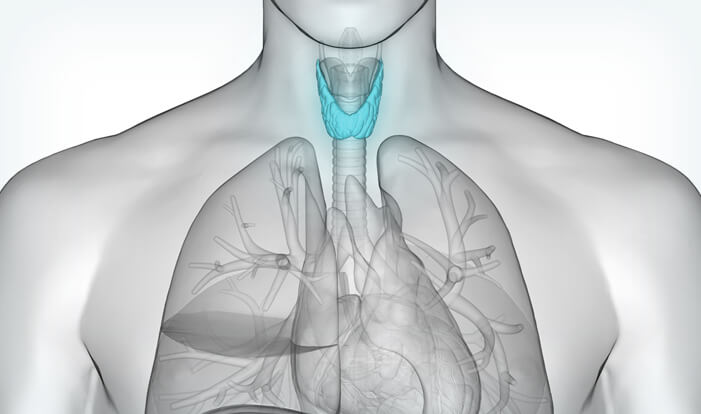Conditions We Treat Thyroid Disease
Overview
The thyroid and parathyroid glands serve entirely different purposes within the body. The butterfly-shaped thyroid gland is located in the lower front of the neck and makes hormones that regulate metabolism and affect heart and digestive function, mood, weight gain or loss, and body temperature. The most prevalent thyroid diseases that require surgical evaluation are: Goiter – Enlarged thyroid, Graves disease, Thyroid cancer – Typically a slow-growing form of cancer, and Thyroid nodules – Lumps on the thyroid gland (usually benign).

Symptoms

Goiter
Many patients experience no symptoms. Others have visible swelling, coughing, hoarseness, throat tightness, difficulty swallowing or breathing.
Thyroid Cancer
A lump on the neck, hoarseness, neck and throat pain, swollen lymph nodes, difficulty swallowing or breathing, persistent cough. There may be little or no symptoms.
Thyroid Nodules
If symptoms exist at all, they may include a neck lump that can be seen and/or felt, neck pain, goiter, trouble swallowing or breathing, voice change, tickling feeling in the throat. Thyroid nodules can produce excess thyroid hormone, resulting in hyperthyroidism symptoms.

Causes
Hyperthyroidism
Graves’ disease, an autoimmune disorder, is the most common cause. With Graves’ disease, the body makes an antibody that causes an overproduction of thyroid hormone. Thyroid nodules and goiter can also stimulate excess hormone production.
Goiter
An enlarged thyroid gland can result from a number of factors, including Graves’ disease, Hashimoto’s disease, thyroiditis, pregnancy, thyroid cancer, and thyroid nodules. In some parts of the world, iodine deficiency is a major cause of goiter; however, iodine is added to table salt and other foods in the United States, making an iodine deficiency an unlikely culprit.
Thyroid Cancer
No one knows what causes thyroid cancer, but the risk increases in people over 40, those who have experienced high doses of radiation, as well as those with a family history of thyroid cancer.

Diagnosis

Many thyroid problems have a genetic component, so if you experience symptoms and have a family history of thyroid issues, it’s imperative you seek a diagnosis. Because thyroid symptoms often mirror those of other health issues, a comprehensive consultation with your primary care provider or endocrinologist including a physical exam and one or more tests may be necessary to provide a definitive diagnosis. Thyroid testing options include:
Blood Test
Checking the level of thyroid stimulating hormone (TSH) can confirm if your thyroid is over- or under-producing the hormone. Frequently, this is the only test used to determine if you have hypothyroidism.
Thyroid Ultrasound
Ultrasound imaging can help diagnose nodules and track the growth over time. While thyroid cancer cannot be diagnosed through ultrasound alone, it is a tool that can help the diagnostic process.
Thyroid Fine Needle Aspiration Biopsy
This test involves a thin needle inserted directly into the thyroid. The needle pulls out some thyroid tissue that is then examined under a microscope. Abnormal cells could indicate the presence of thyroid cancer.

Treatment Options
Goiter
Treatment depends on what’s causing the goiter in the first place. Often, treating the underlying cause (hyperthyroidism, hypothyroidism, etc.) will result in a size decrease or even total disappearance. Many goiters do not cause worrisome symptoms and only need a watch-and-wait plan. However, some of them require surgery to remove part or all of the thyroid because they have grown so large that they impact breathing.
Thyroid Cancer
Surgery is the most common treatment. Patients may have a partial or total thyroidectomy, and some will have lymph nodes removed at the same time. Chemotherapy (rarely) and radiation (including use of radioactive iodine) may also be used to fight the cancer. Medications can keep the body from making thyroid stimulating hormone (TSH), which is crucial because the presence of TSH increases the odds of a thyroid cancer recurrence.
Thyroid Nodules
Non-cancerous nodules may not need any treatment at all. A doctor should monitor the nodules regularly to ensure they remain stable. Some benign nodules can impact breathing or swallowing, in which case surgery is indicated.
Dr. Uecker has many years of experience of surgical treatment of thyroid disease. He regularly works with a multi-disciplinary team to provide comprehensive care to patients suffering from thyroid problems.
